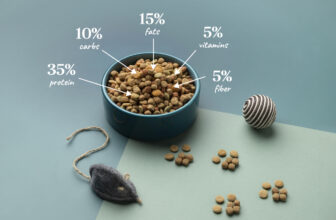
In recent years, organic pet food has gained popularity among pet owners seeking to provide the best for their furry companions. Many believe that organic food is healthier, more nutritious, and better for the environment. However, with this rising trend come questions about its actual benefits and whether it’s worth the investment. In this comprehensive guide, we’ll analyze the benefits and drawbacks of feeding your pet organic food, helping you make an informed decision about your pet’s diet.
What Is Organic Pet Food?
Before diving into the pros and cons, it’s important to understand what organic pet food is. Organic pet food must meet specific standards set by the USDA (United States Department of Agriculture) or equivalent organizations in other countries. These standards generally require that the food is made from ingredients that are:
- Grown without synthetic fertilizers, pesticides, or herbicides.
- Free from artificial preservatives, colors, and flavors.
- Sourced from animals that are raised without antibiotics and growth hormones.
Organic pet food can come in various forms, including dry kibble, wet food, and even raw options.
Benefits of Organic Pet Food
1. Higher Quality Ingredients
Organic pet food often contains higher quality ingredients than conventional pet food. Many brands prioritize sourcing from trusted farms that use sustainable practices. These ingredients are generally fresher and more nutrient-dense, providing pets with better overall nutrition.
2. Fewer Chemicals and Additives
Feeding your pet organic food means reducing their exposure to potentially harmful chemicals. Organic standards prohibit the use of synthetic pesticides, herbicides, and artificial preservatives. This can be particularly beneficial for pets with allergies or sensitivities, as organic food may be easier on their digestive systems.
3. Better for the Environment
Choosing organic pet food can have a positive environmental impact. Organic farming practices promote biodiversity, reduce pollution from synthetic fertilizers, and enhance soil health. By supporting organic agriculture, pet owners contribute to sustainable farming practices that can benefit the planet.
4. Healthier Fats and Proteins
Organic pet food often includes higher-quality protein sources, which can lead to healthier fat content. Many organic brands use pasture-raised meats or fish, providing pets with a better balance of omega-3 and omega-6 fatty acids, which are essential for skin and coat health.
5. Transparency and Trust
Many organic pet food brands prioritize transparency about their sourcing and production practices. This can foster trust among pet owners, who can feel confident that they are providing their pets with safe, high-quality food.
Drawbacks of Organic Pet Food
1. Cost
One of the most significant drawbacks of organic pet food is its cost. Organic ingredients are generally more expensive to produce, leading to higher prices for consumers. For some pet owners, the increased cost may not be justifiable, especially when feeding multiple pets.
2. Limited Availability
Organic pet food options may not be as readily available as conventional brands. While major pet retailers are starting to carry more organic products, finding specific brands or formulas can be challenging, especially in rural areas.
3. Nutritional Balance
Not all organic pet foods are created equal. Some may lack the necessary nutritional balance that pets need to thrive. It’s essential for pet owners to carefully read labels and ensure that the organic food meets AAFCO (Association of American Feed Control Officials) standards for complete and balanced nutrition.
4. Misleading Marketing
The term “organic” can sometimes be misleading. Some pet food companies may use vague language or marketing tactics to suggest their products are organic without meeting strict standards. Pet owners should always look for official certifications and verify claims to ensure they’re choosing truly organic options.
5. No Proven Health Benefits
While many pet owners believe that organic food is healthier for their pets, there is currently no conclusive scientific evidence proving that organic pet food leads to significantly better health outcomes compared to conventional pet food. Many pets thrive on high-quality conventional diets, and individual health can vary based on various factors, including breed, age, and specific dietary needs.
Making the Decision: Is Organic Pet Food Worth It?
Ultimately, the decision to feed your pet organic food depends on your priorities, budget, and your pet’s specific needs. Here are a few considerations to help you decide:
-
Evaluate Your Pet’s Health: If your pet has specific health issues or sensitivities, organic food may offer benefits by reducing their exposure to certain chemicals. Consulting your veterinarian can help you determine whether organic options are suitable for your pet.
-
Consider Your Values: If sustainability and environmental impact are important to you, investing in organic pet food may align with your personal values.
-
Research Brands: Look for reputable organic pet food brands that provide transparency about their ingredients and sourcing practices. Reading reviews and seeking recommendations can also guide your choice.
-
Budget Considerations: Assess whether the higher cost of organic pet food fits into your budget. If not, focus on high-quality conventional pet food with good ingredient lists and positive reviews.
-
Monitor Your Pet’s Response: If you decide to switch to organic pet food, observe how your pet responds. Look for improvements in coat health, energy levels, and overall well-being. This can help you determine if the switch was beneficial.
Conclusion
Organic pet food can offer certain advantages, including higher quality ingredients, fewer chemicals, and better environmental practices. However, it’s essential to weigh these benefits against the potential drawbacks, such as cost and availability. There’s no one-size-fits-all answer; the best diet for your pet will depend on their individual health needs, your values, and your budget. Always consult with your veterinarian when making significant changes to your pet’s diet to ensure you are providing the best nutrition for their health and happiness.





